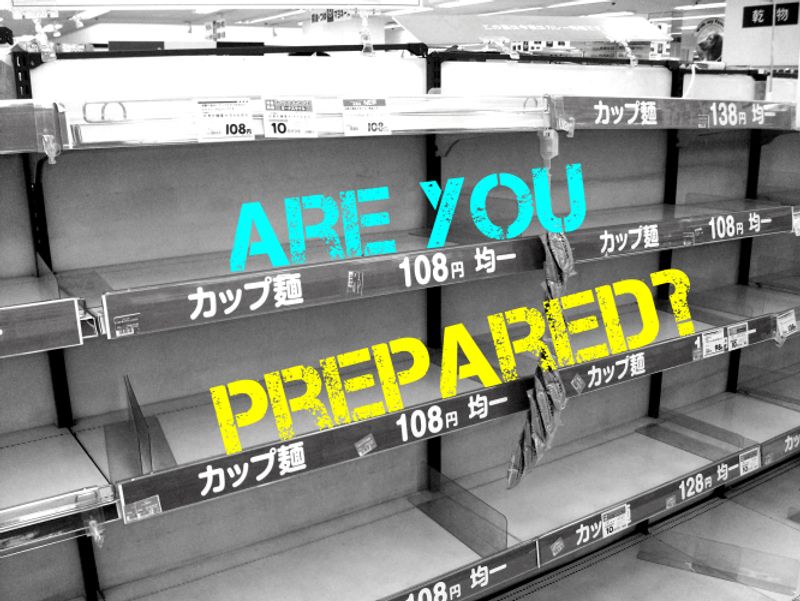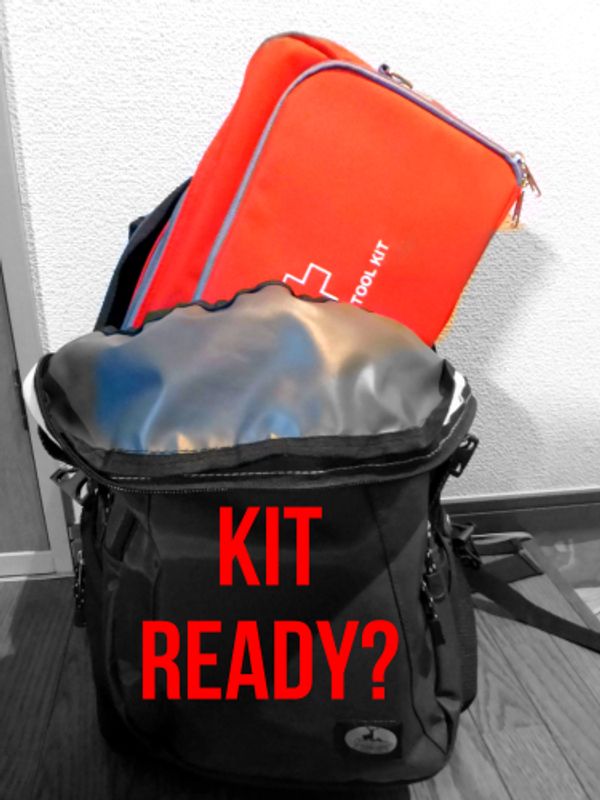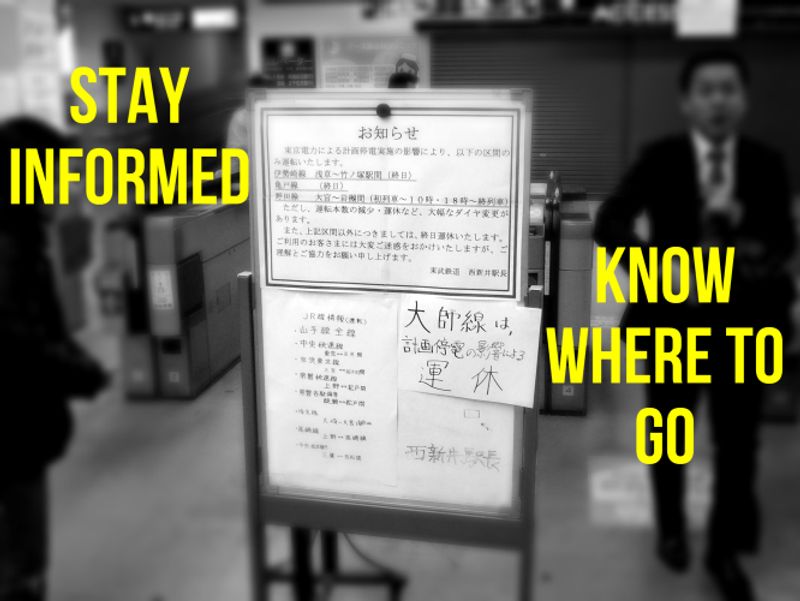Mar 3, 2015
Be Prepared! Earthquake Readiness in Japan
 The 11th of this month marks the 4th anniversary of the Great East Japan Earthquake. Whilst there was clearly nothing 'great' about those terrible events, for those of us fortunate enough not to be in the epicenter they did serve as a sobering reminder of the potential realities of earthquakes. Aside from the more profound life lessons available in the aftermath, one thing this writer learned was that I didn't have a clue what I was doing. Oh, and that I was totally unprepared! In relation to the latter, given the feverish atmosphere in the nation's capital, I wasn't alone.
The 11th of this month marks the 4th anniversary of the Great East Japan Earthquake. Whilst there was clearly nothing 'great' about those terrible events, for those of us fortunate enough not to be in the epicenter they did serve as a sobering reminder of the potential realities of earthquakes. Aside from the more profound life lessons available in the aftermath, one thing this writer learned was that I didn't have a clue what I was doing. Oh, and that I was totally unprepared! In relation to the latter, given the feverish atmosphere in the nation's capital, I wasn't alone.Are You Prepared?
Born either of a sense of civic spirit or marketing savvy (probably a bit of both), in the months following the disaster, stores made a brisk trade in selling earthquake survival kits(防災セット/bousai set); grab-and-go bags stocked with the essentials needed to see you through the potential chaos immediately after an earthquake. The market is somewhat subdued these days, but all cynicism aside, government agencies, local councils, and disaster prevention experts all recommend that you have (and update) a bit of survival kit.

Typical items include …
Basic first aid supplies
Torch and batteries
Radio
Towels and emergency blankets
Dried/canned foods
Water
Don’t forget personal items such as medicines and glasses.
Such bags/kit can be purchased 'ready packed'. One of the easiest places to find them is in we-sell-everything-under-the-sun mega-chain Tokyu Hands. One such example can be found here, although at 28,477 yen it will almost certainly be cheaper to assemble your own with items that are readily available in 100 yen stores, supermarkets, convenience stores, as well as places that deal in zakka.
For those looking to add a bit of extra character to their kit, or who want something more appealing to the little ones, Hello Kitty also do their own version.
Have your emergency kit in an easy to access spot, ready for when it’s time to leave the house. It also pays to know where your essential documents are, have some cash to hand, and a list of contact details. In this writer’s experience, I spent the following weeks following 3/11 going to bed in track-pants lest I was caught unawares and had to bolt out in my undies!
At that time, the items that were hardest to find in Tokyo were bread, instant noodles, portable phone chargers, and petrol/gas for the car. Something to bear in mind!
Both the Tokyo Fire Department and the Tokyo Metropolitan Police Department have multilingual guides to earthquake safety, including recommended items for your emergency kit, and procedures to follow in the event of disasters.
For more ready-packed emergency kit options, an Internet search of 防災セットwill reveal plenty of choice.
What to do? Where to go?
On that day, trying to force my ungainly limbs under a desk, my primary instinct was to get the hell out of the building I was in. All advice points against this, though. In the face of falling objects, shattering glass, and unstable conditions, you're better off staying put until things have settled down. What you should do instead, particularly if you're at home, is turn off the gas (Do you know how?), secure an exit (prop open a door), and then find a space away from potential falling objects.
In the event of a major earthquake (or indeed any disaster situation), your local city office has already designated areas ready for evacuation procedures. They tend to be the grounds of local schools, and/or parks. Check out your city’s homepage for maps and information. Most will have information in English, if not, you’re looking for a tab/link entitled 防災/bousai (Disaster Prevention). On your way to these areas, be vigilant for falling objects.

Once it became clear that the trains were shut down for the night, four years ago, I had no clue how to get home (it was a long way). The line for taxis and buses was positively Biblical, I had no bike, and no idea which direction to take anyway. I also had no idea people would be prepared to walk through the night to get home, but they were, and did (it was a Friday, I suppose)! In such an event, school gyms are often converted into emergency shelters run by volunteers and teachers who happen to be working on the day. Anyone is welcome. Listen out for announcements made by the city office and/or the nearest police box (koban). As with many things in Japanese life, a train station is always a good spot for information and activity.
Staying Informed
If you have a TV, switch it on! If the earthquake was big enough, your screen will be on Defcon 1; a veritable explosion of flashing maps, scrolling data, and newscasters wearing hard hats. You may not understand much, but it’ll give you some idea of how serious things are. For online information in English, open up the Japan Meteorological Agency website. If you have one (it might be tucked away in your emergency kit bag), a radio is also a source for foreign language announcements. Tune in to NHK Radio 2 (693 kHz), if you can.
Staying In Touch
No way home. No clue what to do. No problem, I’ll just make a few phone calls. Yes, sometimes my technical ignorance knows no bounds. Such was the scramble for people to get in touch with one another on that day, the switch boards, networks (or other default terms for facilitating telecommunication), were overwhelmed, making the ability to communicate hit-and-miss at best.
Families would do well to get familiar with NTT’s Disaster Emergency Message Dial (171). This telephone messaging service allows people in disaster zones to leave messages which can be accessed by friends/relatives in other areas. It uses communication centers away from the trouble, hence avoiding any ‘heavy traffic’. Click here for information in English.
If you’re not having any luck with your mobile/cell (or, indeed, if it has run out of power), try public phones, some of which may offer a free service during times of disaster.
In 2011, escalating events and a frenzied media were enough to have some foreign governments putting expats on the next plane home. Whilst this proved to be somewhat unnecessary, if things are serious enough to draw concern from your home nation, be sure to check for announcements on your embassy’s homepage. They may want you to inform them of your whereabouts and current situation. They could also prove to be a vital resource for concerned relatives wanting to know you are well.
From here, your next step towards earthquake readiness should be the homepage of the city in which you reside.



3 Comments
KamaT
on Mar 17
Looks like NTT Docomo are developing a multilingual app to warn of earthquakes. https://www.nttdocomo.co.jp/english/info/media_center/pr/2015/0310_00.html
KpQuePasa
on Feb 12
What a terrifying experience to live through - glad you came out safely on the other side. Out in Nagoya, they tell us that warnings (if possible) will be given over speaker cars in the streets. I am so leery of this because usually those cars just advertise sales and so I've learned to tune them out (boy who cried wolf style). So, you know, that's awesome. I wondered if you knew of any resources for people with pets? I have struggled to find information that goes past "just leave them behind for an unknown period of time to fend for themselves" Which... I'm not going to do.
KamaT
on Feb 13
@KpQuePasa Thanks. Yea, there's a lot of noise on the streets over here. Most of it indistinguishable for me! I can't say I know about what to do with pets. I'd always just assumed I'd take them with me (if I had any). They always say to keep calm, and not rush out of buildings while things are still shaking, so it seems to me that if we're staying calm and thinking clearly, we can round up the pets and head out together. I'll be sure to let you know if I find any info on this.